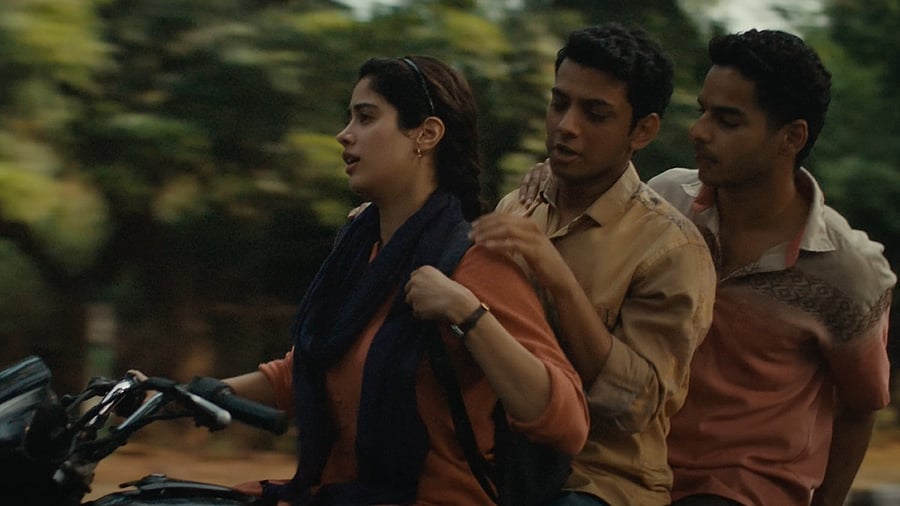
Janhvi Kapoor, Vishal Jethwa and Ishan Khatter in a scene from the film.
Credit: Special Arrangement
Neeraj Ghaywan's 'Homebound' — now India's official entry to the Oscars — presents familiar commercial and arthouse tropes like Islamophobia and discrimination against Dalits while narrating the story of two best friends who would, obviously as pivots in the story, go through a clash before reuniting?
For one, director and co-writer Ghaywan does not rest solely on the critical acclaim he earned for his debut feature 'Masaan'. He strikes a fine balance — never once exasperating the viewer. Instead, he compels the audience to think deeply and engage with the lives of his central characters and their families.
Chandan (Vishal Jethwa) is a Dalit who prefers to hide his caste. He lives in a small north Indian town. His underprivileged family includes Vaishali (Harshika Parmar), who is forced to earn as Chandan is yet to get the police job both he and Shoaib dream of. They also believe that the job will get them more respect in society. Chandan also wants to marry Sudha Bharti (Janhvi Kapoor), who is from an upper-caste family and is also in love with him.
His close friend Shoaib (Ishaan Khatter) is repeatedly targeted because of his religion. At a party hosted by his boss, he is humiliated and taunted when Pakistan loses a cricket match to India. Enraged, he decides to move to Surat to work in a mill.
Before this, the two friends (both of whom love the biryani that Shoaib’s mother makes) face friction when Chandan is selected for the police job but Shoaib fails to make it. But Chandan’s dream is short-lived when he learns that his final appointment will be delayed by a year.
Shoaib reconciles with Chandan, and together they eke out a modest existence in Surat. All is well until the pandemic strikes and they find themselves out of a job (and money). After all options fade, they are left with no choice but to trek back home. And that’s when their bonding is tested. After all, such friendship is a powerful metaphor for an idyllic India.
Within this basic and tragic narrative (whose climax was inspired by a New York Times article about two real friends during the pandemic), Ghaywan and his writing team renders a heartwarming story about compromises in life, dignity of labour, the lack of basic human empathy, and the ironies of our system. Without being preachy, the film calls out our collective conscience and tells us to be that much more human.
Ishaan Khatter delivers a commendable performance, beautifully capturing innocence, vulnerability, and determination. Vishal Jethwa is exceptional as the frustrated Chandan, who longs for Shoaib’s mother’s biryani while walking to his distant home more than a hundred miles away. Janhvi Kapoor makes the most of her brief screen time with a dedicated performance.
Technically, the film is upscale with its cinematography (Pratik Shah), editing (Nitin Baid), background score (Naren Chandavarkar and Benedict Taylor), costumes (Rohit Chaturvedi) and production design and art direction (Khyatee Mohan Kanchan and Vatsal Dhamani) all being wonderfully subservient to the plot and theme of the story.
Neeraj Ghaywan has made this film as a catharsis in part, infusing it (as he told me) with many personal touches that question not just India, but the world at large. It is a story that can resonate from Bikaner to Boston and beyond. And Inshallah, bring India its first Oscar.